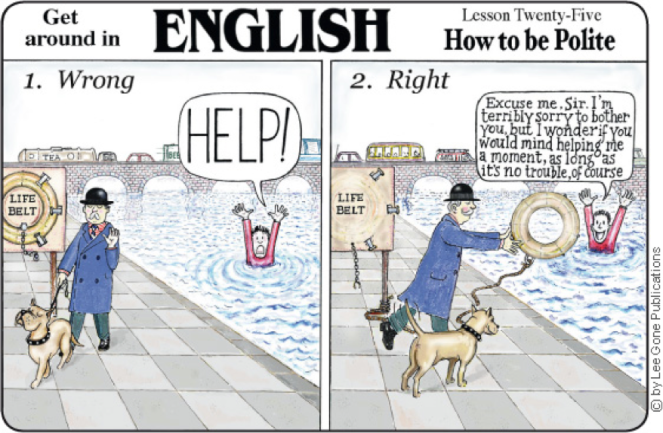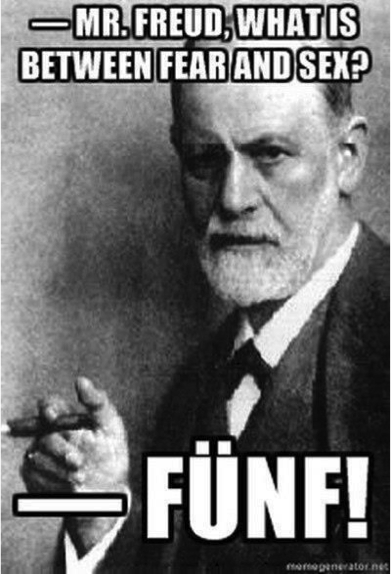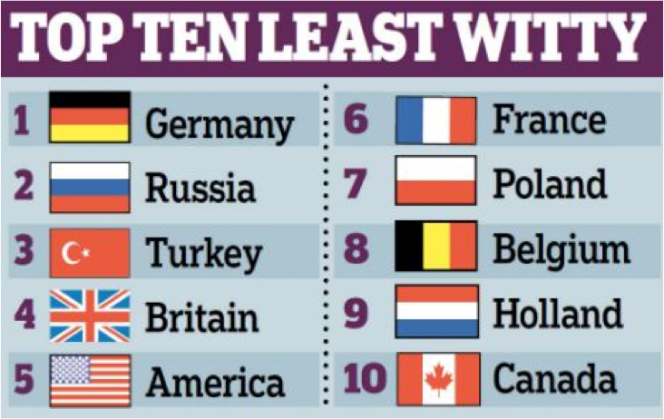A commonly held contemporary British view is that the Germans have no sense of humour. But can this be possible? Can there genuinely be a nation incapable of laughter, or is it just that the German language of laughter differs so greatly from our own, that it appears non-existent?
British humour carries a strong element of satire aimed at “the absurdity of everyday life”. Themes include the class system and sexual taboos; common techniques include puns, innuendo and intellectual jokes.

A strong theme of sarcasm and self-criticism, often with deadpan delivery, runs throughout British humour. Jokes are told about everything and almost no subject is taboo, though often a lack of subtlety when discussing controversial issues is considered crass. Many UK comedy TV shows typical of British humour have been internationally popular, and have been important in representing British culture to the international audience.
On the other hand, German humour refers collectively to the conventions of comedy and its cultural meaning within Germany. Comedy is a staple of German culture, with many Germans making light of situations in social conversation, and with a large amount of time allotted to comedy in German television broadcasting.

Germans distinguish between “Comedy” (using the English word) and “Komödie” (the German word of the same origin). “Comedy” refers to post-1990s TV-comedy, which is characterized by comedic entertainment in the form of stand-up comedy, stage shows, modern satire, cabaret and adaptations of foreign comedy concepts, including airing of foreign shows. “Komödie” refers to films and plays.

In an international poll in 2011, Germany was voted as the least funny country in the world. We aren’t as funny as we like to think- Britain came fourth in this poll. The survey of 30,000 people in 15 countries was conducted for social networking site Badoo.com, whose spokesman Lloyd Price said: ‘Germans are brilliant at so many things, including making cars and beating us at football. Unfortunately, telling jokes isn’t always one of them. If only there was a comedy World Cup, we might stand a chance against them.’

However, how reliable is this poll? Is this poll based on stereotypes? Why are Germans still seen as humourless? Bernhard-Viktor von Bülow, also known as ‘Loriot’, is a German writer and cartoonist and actor. He was famous for his drawn characters where their trademark was their huge noses. The humour in Loriot’s drawings, TV sketches and films were mostly built on all sorts of miscommunication, often with a touch of vulgarity. He caricatured everyday life and family life as well as civil society. Loriot was asked what he thought of this typical stereotype and he said: “The Germans have certainly as much sense of humour as every other nation. The only difference is that they value the worth of the comical quite differently. The comedian is valued much lower than the tragic actor.”

“Most men do not know what is going on in the head of their female.”

This egg is hard
“The Heute-Show” is a German television program which is an adaptation of “The Daily Show”. The Heute Show presents the weekly news with funny or sarcastic and cynical comments, especially focusing on issues that are subject of the latest political discussions in Germany. Here is a clip on what the Germans think of Brexit:
Heute-Show:
Here is another video on Donald Trump and the American voters:
What do you think of German humour now?
EXTRA:
Two years ago, someone hacked into the UCL email system and everyone woke up with 3000 emails in their inbox. Here is a video with a German twist showing all our frustrations quite clearly:
Bello-gate UCL:
By Narmatha Pathmanathan